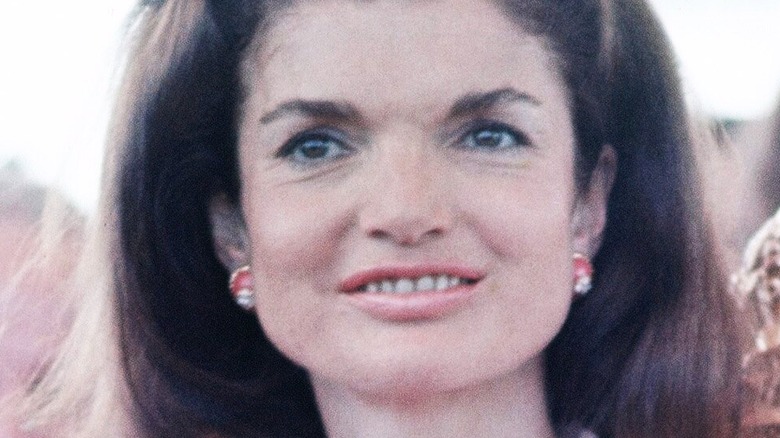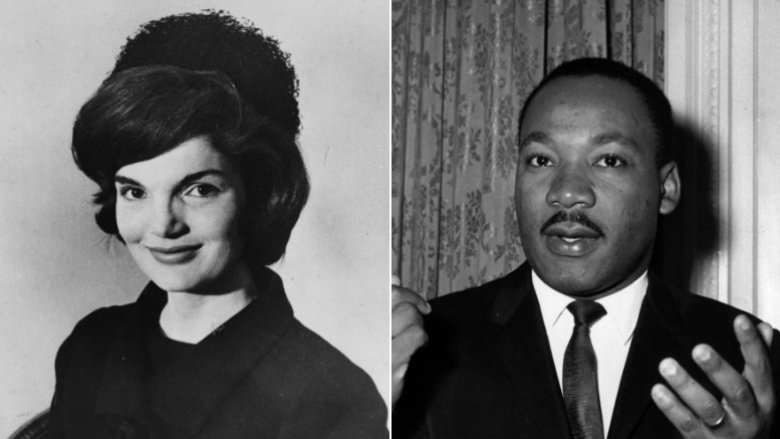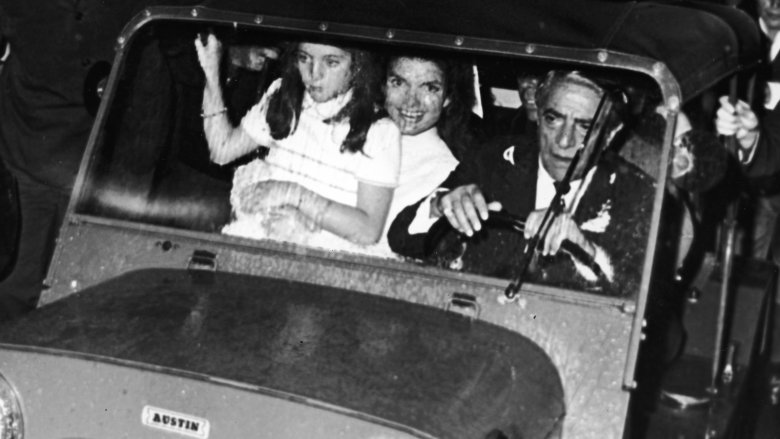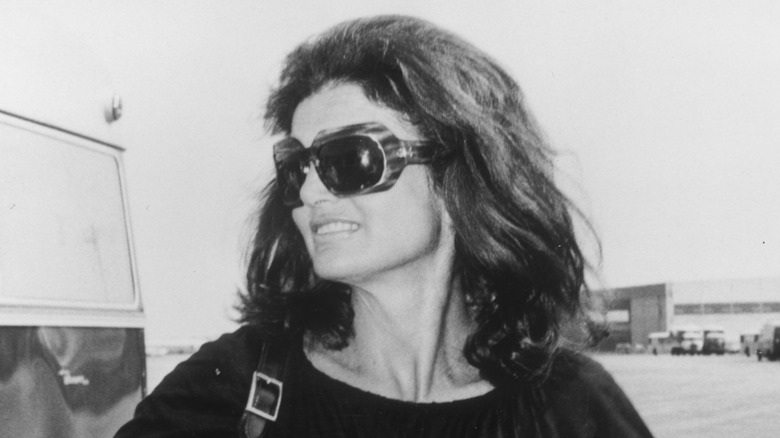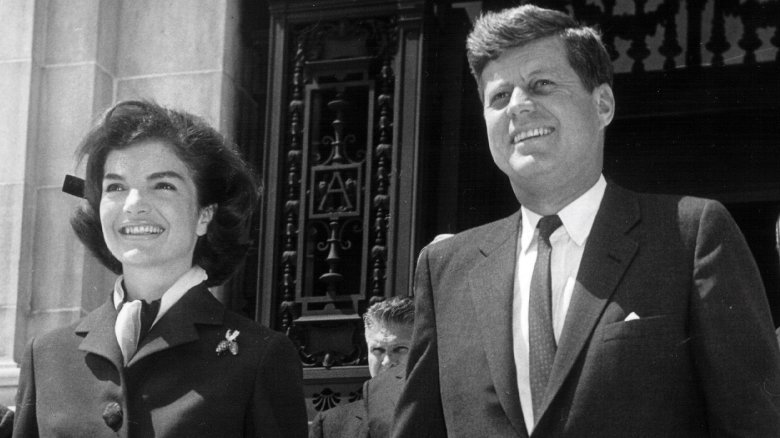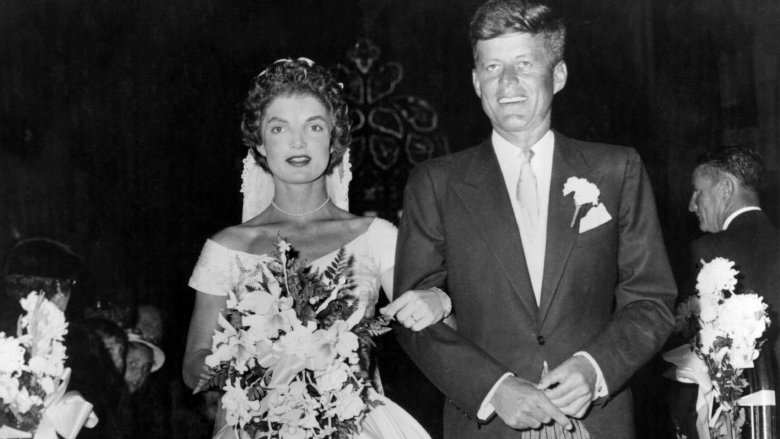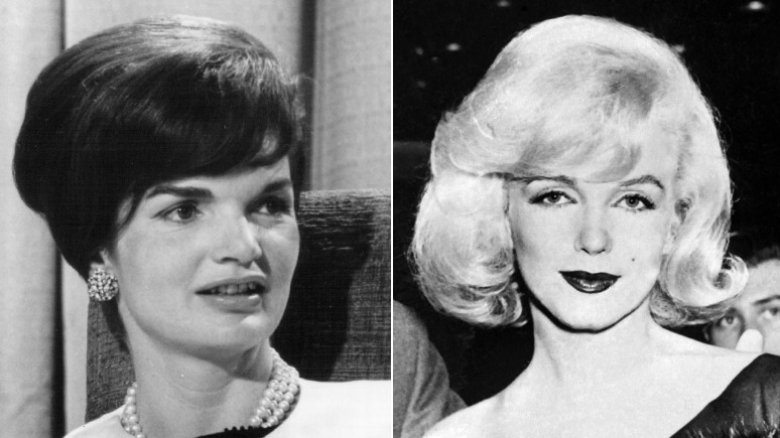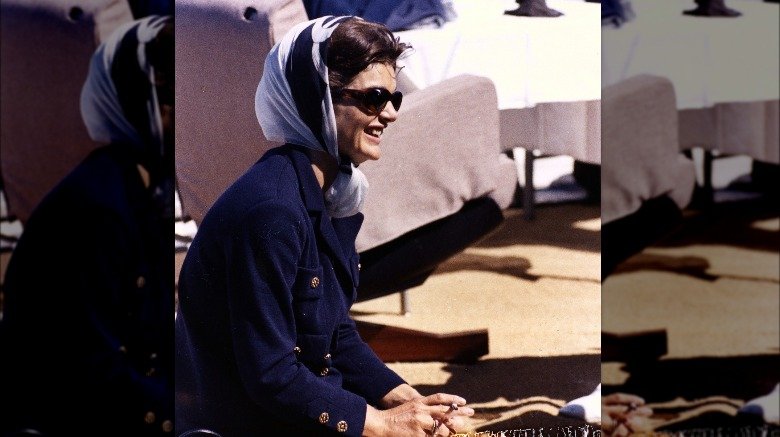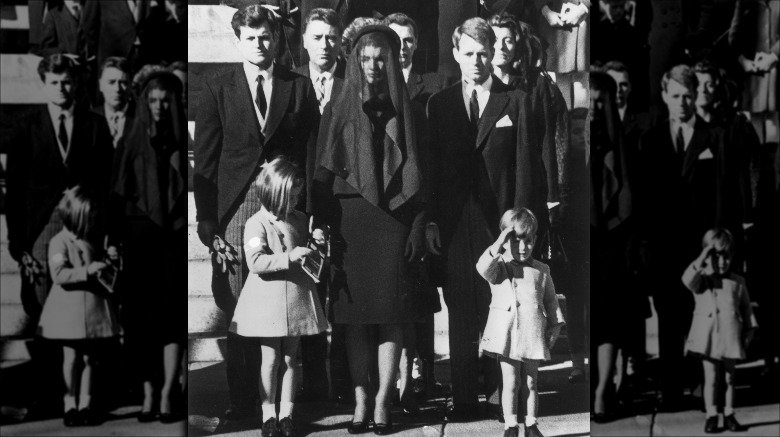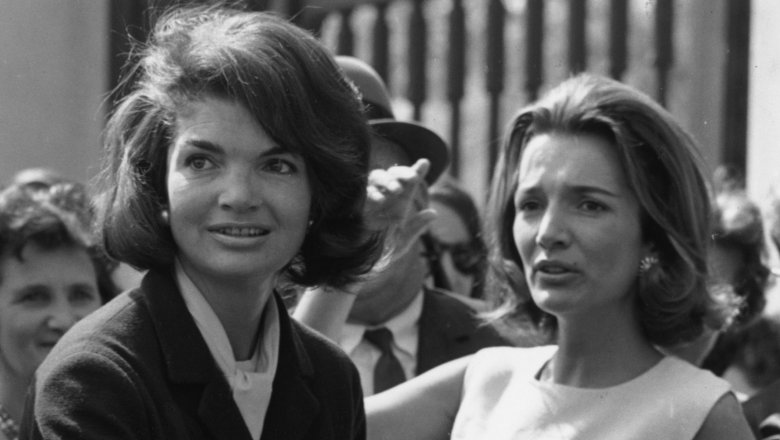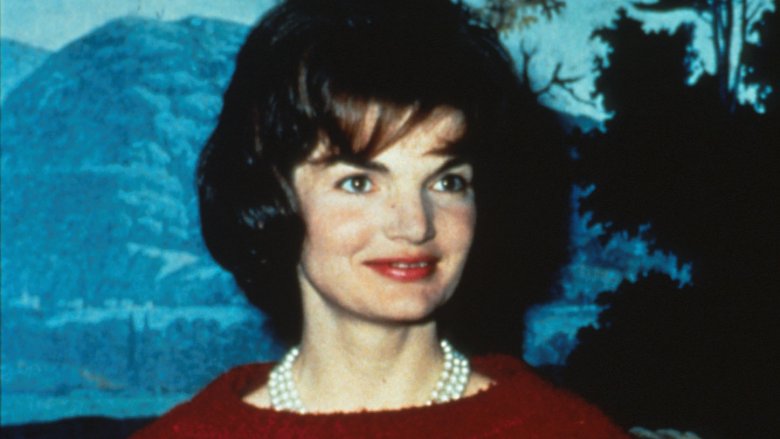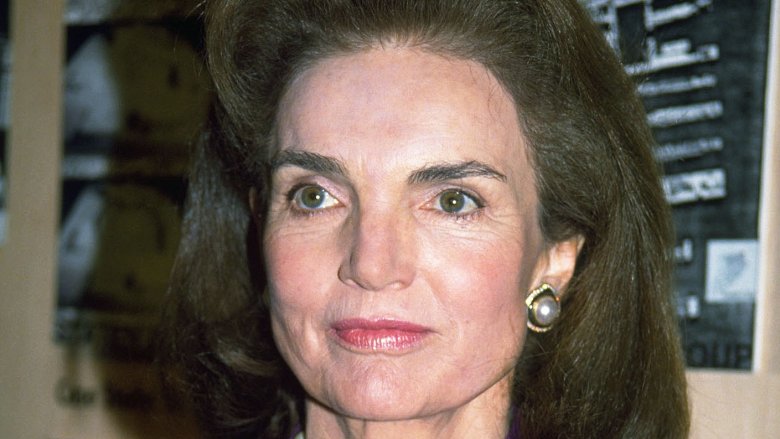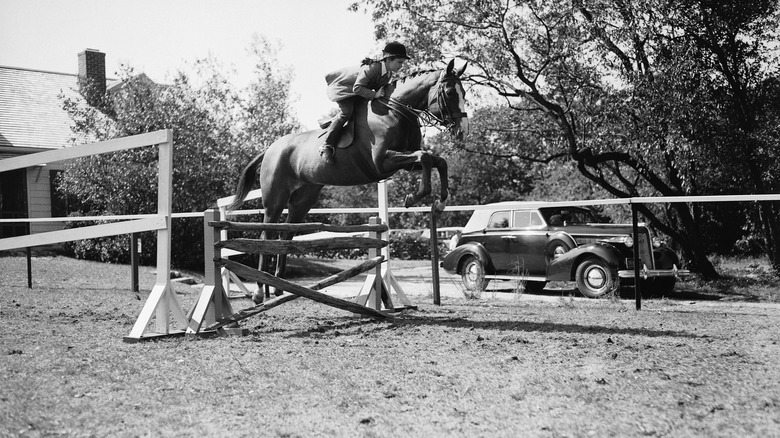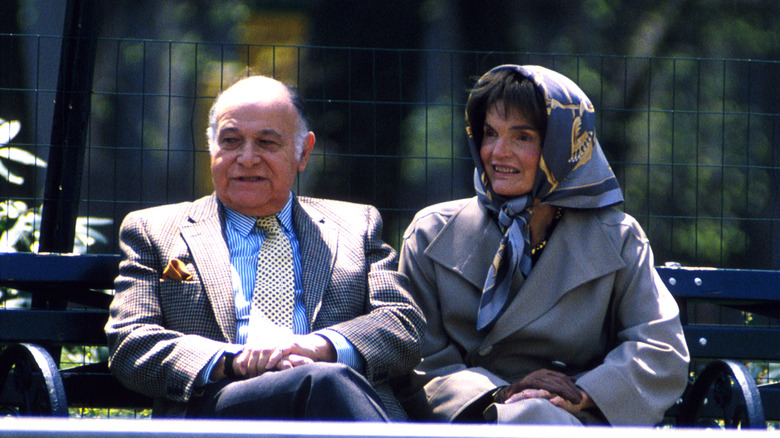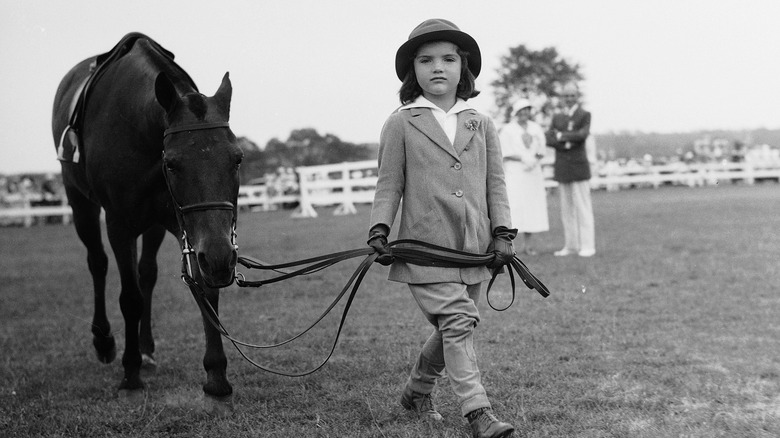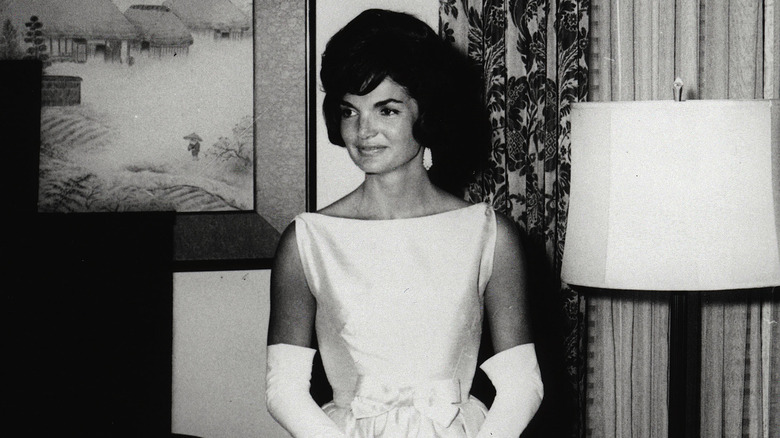The Untold Truth Of Jackie Kennedy
We may receive a commission on purchases made from links.
In 1970, The New York Times called Jackie Kennedy Onassis "the world's most written-about woman." With her outsized sunglasses and breathy, measured voice, she was notoriously private, "distrustful of the press," and reportedly prone to "dropping friends" if she felt they'd "betrayed her" (per E! News).
Born in Southampton, New York on July 28, 1929 to well-heeled parents, the former first lady didn't always shy away from the spotlight. During the first year of John F. Kennedy's presidency in 1961, Jackie "made over the White House into a living stage," according to journalist Hugh Sidey (per The New York Times). In 1962, 56 million people watched Jackie's Emmy-winning televised tour of the revamped White House, an event that found her trotting out a Minerva clock and candelabra and a mirror that belonged to George Washington. Meanwhile, her singular style — pillbox hats, Chanel, and Givenchy — turned Jackie into a fashion icon.
On the afternoon of November 22, 1963, the unthinkable happened: JFK was shot and killed in Dallas, Texas while riding next to Jackie "in the back seat of an open limousine" (per NBC News). A week later, Jackie grimly recounted the assassination. "I could see a piece of his skull coming off," she said (via The Seattle Times). A "grieving public" became obsessed with Jackie's "poise and grace" in the tragedy's aftermath (per History), and that obsession hasn't waned. Here are some lesser-known facts about the enigmatic, eminently quotable Jackie Kennedy.
She wasn't always so polite
The word "snarky" doesn't spring to mind when thinking of Jackie Kennedy, but there could be real bite beneath her poise and primness. Once questioned about "what she fed her German Shepherd," Kennedy reportedly replied: "Reporters." In 1966, an acquaintance allegedly asked her if she'd bumped into "a tiny, thin, gay interior decorator" who'd helped arrange her apartment (per The New York Times). Kennedy reportedly responded: "Oh yes. I did see him the other day. I almost stepped on him in the elevator."
A set of interviews — recorded in 1964 and published in book form in 2011 — suggest a woman whose prickliness resembled "one of the Real Housewives." Don't believe us? Kennedy compared Lady Bird Johnson, wife of U.S. President Lyndon B. Johnson, to "a trained hunting dog." She also referred to Indira Gandhi (before she became India's prime minister) as a "prune" (per NBC News).
In fact, Kennedy claimed she couldn't "see a picture of Martin Luther King without thinking, you know, that man's terrible." That's evidently because her brother-in-law, Robert Kennedy, had heard a taped conversation in which King "made fun of [John F. Kennedy's] funeral." She called King "a phony," claiming she'd heard he'd arranged "sort of an orgy in the hotel" around the time of the 1963 March on Washington. According to Politico, her daughter, Caroline Kennedy, suspected "poisonous" FBI Chief J. Edgar Hoover "had passed on something that Martin Luther King said about my father's funeral" to her mother.
The world was outraged when she remarried
Media coverage was far from even-keeled when Jackie Kennedy married wealthy "Greek shipping tycoon" Aristotle Onassis on October 20, 1968 (per Time). According to The Washington Post, one newspaper claimed: "America has lost a saint." Meanwhile, The New York Times reported that "the reaction [in NYC] is anger, shock, and dismay." A headline in Swedish newspaper Expressen shouted: "JACKIE, HOW COULD YOU?" (via Time). And because it rained on their wedding day, some superstitious folks evidently told The Washington Post: "The gods are weeping."
As Time reported, these sour sentiments were sparked by the perceived suddenness of the wedding announcement and the prevailing opinion that Kennedy "was marrying out of her church and culture." Biographer Donald Spoto wrote that her "legion of admirers kept her like a butterfly in amber" because they wanted to continue seeing her as "a brave, bereaved woman" (via The Washington Post). Nevertheless, the supposedly "secret" ceremony — with its "sugared almonds" and "waiting yacht" — ultimately took place on the Greek island of Skorpios, almost five years after the JFK assassination.
Her marriage to Onassis — a man The Telegraph described as "short, pugnacious, but extremely wealthy" — wasn't a particularly happy one. According to Time, Onassis nicknamed his wife "The Widow." After his 24-year-old son Alexander died following a 1973 plane crash, he then reportedly called her "The Witch." Time reported that Onassis was "deeply superstitious" and irrationally "blamed her for the loss that broke his heart."
She ended an engagement in a particularly chilly manner
A few months prior to meeting her future husband, Jackie Kennedy reportedly ended her engagement to a stockbroker named John Husted Jr. in March 1952 — and in an incredibly brusque manner (per The Telegraph). According to the 2018 biography "Jackie, Janet & Lee," the relationship hit the skids after Kennedy's mother, Janet Auchincloss, learned Husted's annual salary, which was reportedly $17,000 (via People). That's about $174,000 in today's economy. Auchincloss reportedly told Kennedy to end the relationship — while they were both attending their "engagement party," reported People.
It sounds like Kennedy didn't let Husted down easily, either. Shortly after dumping him, Kennedy reportedly "dropped the ring back into Husted's coat pocket" (per People). "She was ice cold," Husted recalled in the biography. "Like we never knew each other." Author J. Randy Taraborrelli wrote that "Jackie was not a mercenary person. Whenever she had to make one of those decisions, it was usually her mother behind it" (per People). According to Reader's Digest, Auchincloss "didn't want her daughters to ever struggle financially."
In the back of her mind, Kennedy may have known this relationship wasn't built to last. In January 1952, Husted reportedly took her to meet his mother, who tried giving her potential daughter-in-law a photo of Husted as a boy (per The New York Times). "No, thank you," Kennedy reportedly said. "If [I] want any photos I can take my own."
How did she feel about JFK's alleged infidelities?
One particularly memorable Jackie Kennedy quip: "Sex is a bad thing because it rumples the clothes." Of course, she was being facetious, but perhaps only to a degree: John F. Kennedy reportedly had a number of affairs while married to Jackie, and it sounds like she wasn't in the dark about them.
In the 1997 book, "The Dark Side of Camelot," author Seymour Hersh claimed JFK was "consumed with almost daily sexual liaisons" in 1961, the same year he was inaugurated (via People). Pamela Keogh, author of the 2001 book "Jackie Style," told People that Jackie "came from a world where that is what men did, and it was accepted." That assessment jives with a passage from Jackie's personal correspondence: "He's like my father in a way," she allegedly wrote of JFK (per The New York Times). "Loves the chase and is bored with the conquest — and once married needs proof he's still attractive, so flirts with other women and resents you."
Lending some context to the situation, socialite Cornelia Guest told People that women from that era tended to talk about unfaithful husbands. (C.Z. Guest, her late mother, was reportedly one of Jackie's friends.) "It was more like, 'This is what's going on; let's go out and get the kids and get on a horse,'" Cornelia said. "They were much more pragmatic about the whole thing." Meanwhile, various other reports suggest Jackie wasn't at all calm about these alleged indiscretions.
She reportedly wanted to divorce the president
John F. Kennedy's alleged infidelities have been widely reported. According to People, the 35th president of the United States purportedly bedded the likes of "White House intern" Mimi Alford, Judith Exner (also the alleged mistress of Chicago mobster Sam Giancana), and, most famously, actor Marilyn Monroe. In their 2014 book "Jacqueline Kennedy Onassis: A Life Beyond Her Wildest Dreams," authors Darwin Porter and Danforth Prince made quite a scandalous claim: Namely, that Jackie Kennedy intended to divorce JFK. Had she done so, it would've made Jackie the first-ever first lady to "divorce a sitting President," reported the Daily Mail.
The book claimed Jackie was at her wit's end over JFK's alleged affairs, and Monroe's notoriously sultry "Happy Birthday Mr. President" roundelay supposedly proved to be the breaking point. Jackie's father-in-law, Joe Kennedy, reportedly "offered" to give her "a check for one million dollars" to prevent the divorce (per the Daily Mail). If the book can be believed, Jackie told Joe that amount would need to be kicked up to "twenty million dollars" if JFK happened to "[bring] home any venereal disease."
In "Jackie, Janet & Lee," author J. Randy Taraborrelli claimed Jackie considered divorcing JFK on at least two occasions (via People). Both times, she was reportedly talked out of the idea by her mom, Janet Auchincloss, and her sister, Lee Radziwill. According to Taraborrelli's book, Radziwill told Jackie that "it didn't matter that [JFK] was unfaithful."
Was there a showdown between Marilyn Monroe and Jackie Kennedy?
To what extent did Jackie Kennedy and Marilyn Monroe know one another, if at all? In his 2013 book, "These Few Precious Days: The Final Year of Jack with Jackie," author Christopher Andersen claimed they were bonafide romantic rivals who indulged in at least one verbal sparring match.
Andersen wrote that Kennedy perceived Monroe as a credible threat and "a loose cannon" — someone who could "go public" with her alleged presidential affair and "destroy her marriage" with the dirt (per The Telegraph). If there's any credence to this story, perhaps Kennedy had good reason to be concerned. According to Andersen, Monroe was prone to asking her pals: "Can't you just see me as first lady?"
Elsewhere in the book, Andersen claimed Monroe rang up Kennedy at the White House one fateful evening and let her know all about the affair. According to Andersen, Monroe told the first lady that her husband was eager to abandon his family and embark on "a new life" with her (via Inside Edition). Unfazed by this scenario, Kennedy reportedly responded with withering sarcasm: "Marilyn, you'll marry Jack. That's great. And you'll move into the White House and you'll assume the responsibilities of First Lady, and I'll move out and you'll have all the problems."
Was she imprisoned by her celebrity?
Perhaps it was an understatement when E! News claimed Jackie Kennedy was "distrustful of the press." Asked by Newsweek in 1994 how she felt about all the "tabloid stories," she replied: "The river of sludge will go on and on. It isn't about me" (via Women's Words).
From fashion choices to preferred vacation spots, nearly every aspect of Kennedy's life has been dissected and discussed: How she reportedly smoked, but "White House photographers" weren't allowed to photograph her mid-cigarette (per First Ladies). How she was already an accomplished equestrienne by age of 11. How she "won [two] restraining orders" against "paparazzo superstar" Ron Galella, who reportedly spent decades "stalking" her (per Salon). No wonder Norman Mailer called Kennedy the "Prisoner of Celebrity."
That level of scrutiny must have been maddening. In 2004, a "Jackie O. Kennedy insider" named Edward Klein told CNN that Kennedy "watched what she ate." The media clearly watched what she ate, too. John Loring, a "colleague" of Kennedy's, told People: "She'd pull out carrot sticks if we were hungry. Then we'd have two." In her book, "Jackie's Girl," "former assistant" Kathy McKeon claimed "the toll of the horror she survived was plain to see on [Kennedy's] painfully thin frame" (per AOL). In 1989, the South Florida Sun-Sentinel reported that she ate "miniature Tootsie Rolls" at work, while the Los Angeles Times noted "rocky road" was "her favorite" ice cream. (Is this "the river of sludge" Jackie was referring to?)
She reportedly considered suicide after JFK's assassination
In the days after the assassination of John F. Kennedy, Jackie Kennedy reportedly "turned to alcohol and pills" and reached out to a priest to talk about "suicidal thoughts," according to People. She also reportedly wrote to a priest named Joseph Leonard and confessed she felt "bitter against God" (per People).
According to Thomas Maier's 2003 book, "The Kennedys: America's Emerald Kings," Jackie asked a priest named Father Richard McSorley if "God would separate her from her husband if she killed herself" (via People). McSorley told Maier he began schooling Jackie on the church's views regarding suicide, but she reportedly cut him off to say: "Father, I understand. I know it's wrong. I wouldn't do it. But it's so lonely out there."
According to Vanity Fair, Jackie kept "reliving her husband's assassination" throughout "the long winter of 1963." At the time, she reportedly admitted she was "not in any condition to make much sense of anything." As her former secretary, Mary Gallagher, remembered: "Jackie's bedroom was on the second floor and she seldom left it. I was constantly aware of her suffering."
Her relationship with her sister was rife with drama
Jackie Kennedy and her sister, the late Lee Radziwill, had a famously contentious relationship. In "The Fabulous Bouvier Sisters," authors Sam Kashner and Nancy Schoenberger suggested "Lee may have had an affair with John F. Kennedy" (per InStyle). In the words of the Daily Mail, the book alleged that Jackie "sought her revenge" and thus began a relationship with Aristotle Onassis — the man Radziwill was reportedly "in love with." After Jackie died in 1994, it was discovered that she'd "set up $500,000 trust funds" for Radziwill's two kids in her will (per Vanity Fair). Radziwill reportedly got nothing, and a section of Jackie's will allegedly explained why: "I have already [helped her] during my lifetime."
From dark to darker: In her interview with Vanity Fair, Radziwill claimed she felt "free" when JFK's presidency ended. "There were so many things I couldn't do when my brother-in-law was president," she was quoted as saying. According to the magazine, Radziwill also told her friend, the photographer Cecil Beaton, that Jackie was "more than half round the bend" after JFK's death — to the extent that she couldn't "stop thinking about herself ... [or] feeling anything but sorry for herself." Jackie allegedly "even slapped Lee across the face" at one point.
In an interview with McCall's (via Vanity Fair), Radziwill reportedly scoffed at how she'd been portrayed by the media during JFK's presidency: "It was so limited, so ... jet-set, empty, cold, and not true."
Why so much secrecy over Jackie Kennedy's personal artifacts?
Caroline Kennedy is incredibly protective of her late mother's "personal papers," per The New York Times. This may somewhat explain why so many Jackie Kennedy-related items seem to be hidden away. Taped interviews with Jackie from a scrapped book called "The Death of the President" will reportedly be "sealed until 2067." The bloodstained "pink suit" she wore on the day of JFK's assassination will allegedly remain in "a vault ... at least until 2103."
As The New York Times reported, a man named Gil Wells from Richmond, Va., faced a mind-boggling level of bureaucracy after he "formally deeded" what amounted to "two small sheets of White House notepaper" to the government in 2016. Wells' godmother evidently stumbled upon these papers amongst her belongings in 2015. "The handwriting was Jacqueline Kennedy's, and the notes were a list she had drawn up ... for her personal assistant," reported The New York Times. It detailed Jackie's "hour-by-hour schedule alongside the clothes and accessories to be packed, including the now-iconic pink ensemble she was wearing when her husband was assassinated."
"I saw 'Nov. 22' and 'pink and navy Chanel suit,'" Wells said. "I just got the sickest feeling in my stomach." The notes landed at the John F. Kennedy Presidential Library and Museum in Boston, Mass., but Wells was reportedly told they wouldn't be "made public" without Caroline's go-ahead. In May 2018, Wells died before his historic finds ever saw the light of day.
She had a dazzling career later in life
Soon after the death of Aristotle Onassis, Jackie Kennedy returned to work (per Town & Country). She contacted the late Thomas Guinzburg, then the president of Viking Press, and scored an editing position that paid "$200 a week" (just over $1,000 today). As Town & Country reported, it was her first paying gig since 1953. (She'd previously been an "inquiring camera girl" for the Washington Times-Herald).
Her first day reportedly caused a stir. Journalists hovered outside the office building as her taxicab arrived. "There were bomb threats, security people, press people dressed up as messengers," Guinzburg recalled in "America's Queen" by Sarah Bradford (via Town & Country). The transition was rocky: Kennedy reportedly endured "eye rolling" from peers but ultimately "acquired nearly 100 works of fiction and nonfiction" over her 19-year career. She resigned from Viking Press in 1977 and was hired by Doubleday the next year, where she edited Michael Jackson's "Moonwalk." Kennedy opened up about her career in a 1979 Ms. profile (via Vanity Fair): "You have to do something you enjoy," she said, describing "happiness" as "complete use of one's faculties."
In an excerpt (via Vanity Fair) of Greg Lawrence's 2011 book, "Jackie as Editor," a former assistant said Kennedy remained "upbeat" at work, even after learning she had non-Hodgkin's lymphoma. She died on May 19, 1994, and many of "her authors" reportedly "left Doubleday" soon after. Lawrence wrote: "They couldn't bear the idea of working there without Jackie."
Her father was a troubled man
Although John "Black Jack" Vernou Bouvier Jr., Jackie Kennedy's father, was considered a "dapper figure," he was also known for his quick temper, according to "America's Queen: The Life of Jacqueline Kennedy Onassis" by Sarah Bradford (via The New York Times).
In addition to his temperament, Bouvier was also a gambler, a womanizer, and a drunk. "He had a reputation for treating his women badly, overwhelming them with attention when he was pursuing them, dropping them quickly and without remorse when he had tired of them," Bradford wrote, per The New York Times. "Proud though he was of his wife Janet's looks, chic and prowess as a horsewoman, he was essentially a predatory male, a risk-taker, incapable of resisting temptation or self-gratification."
He also had a penchant for naked sunbathing, according to The Rake. Despite his flaws, Kennedy was devoted to her father, according to Bradford's book. But following the divorce from his wife Janet in 1940, Bouvier fell hard into his drinking habits, which made him unable to walk his daughter down the aisle when she married John F. Kennedy in 1953 (via The Rake). The outlet also noted that Bouvier died from his alcoholism four years after that wedding, at the age of 66.
Jackie Kennedy got a terminal cancer diagnosis in her 60s
When Jackie Kennedy received her non-Hodgkins lymphoma diagnosis in January 1994, folks thought it would be treatable. One day before she died in May 1994, however, Kennedy was told by doctors that her cancer had spread too far for treatment, according to The Washington Post.
The newspaper noted at the time that Kennedy had been going through chemotherapy since her diagnosis, because doctors thought she would have a positive outcome. Just after her death at age 64, The Baltimore Sun released an article outlining how common and fast-moving non-Hodgkin's lymphoma is as a disease.
In 1994, The Baltimore Sun reported that survival rates varied from 31% to 52%, including 45,000 new cases, and the disease would kill 21,000 people a year. As of 2022, the death rate is slightly lower at an estimated 20,250 people with over 80,000 diagnoses, according to the American Cancer Society. "Even in the best of (treatment) programs, one-third of patients don't respond well, and two-thirds ultimately die of the disease," Dr. Rex Greene, chief of the cancer teaching program at Huntington Memorial Hospital told the Los Angeles Times following Kennedy's death in 1994.
A teacher referred to young Jackie Kennedy as 'full of the devil'
Despite being a bright young student, Jackie Kennedy wasn't necessarily a good student. When she was in grade school, one of her teachers named Miss Platt reported that Kennedy was "a darling child, the prettiest little girl, very clever, very artistic, and full of the devil," (via the JFK Library). The outlet reported that Kennedy was known for getting into trouble and her grades could suffer because of her classroom behavior. Childhood only became harder for her after her parents divorced when she was 10 years old, per the JFK Library.
Little Jackie may have been fond of antics, though that likely stopped when she went to the prestigious Miss Porter's School in Connecticut. According to Biography, the school is known both for its stringent academic curriculum as well as its tradition of teaching manners. Biography also noted that Kennedy was dubbed Debutante of the Year by a local paper when she was a high school senior.
So maybe her mischievous childhood got left behind after all.
She turned down a prestigious job at Vogue
In her senior year at The George Washington University, Jackie Kennedy beat out almost 1,300 other candidates to win Vogue's Prix de Paris competition, a contest that would allow the winner to work as a junior editor at the publication for a year — spending six months in New York City and six months in Paris (per The Buffalo News).
But even though the competition was fierce and had previously been won by such iconic authors as Joan Didion, Kennedy ended up turning it down. Her excuse? She had just spent her junior year abroad in Paris, and her mother didn't want her to move away again. Kennedy's mother felt "terrifically strongly about 'keeping me in the home,'" Kennedy wrote when she turned down the position.
And stay close to home she did. Kennedy remained in D.C. after she graduated college and began working for the Washington Times-Herald, per Vogue. It was during this time in her life that she met then-Senator John F. Kennedy — her future husband and future president of the United States — and the rest, as they say, is history.

